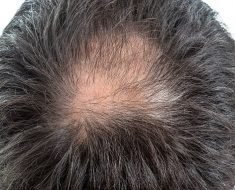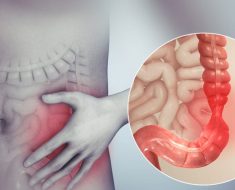Pregnant women have MORE THAN 50 gender-bending chemicals in their blood: Substances are linked to birth defects and harm a baby’s development in the womb, reveals study
- Hormone-disrupting chemicals include parabens, BPA and triclosan
- Considered ‘gender benders’ due to them encouraging male breast growth
- Parabens, used as preservatives in skincare, may cause cancer and weight gain
- BPA is added to receipts, and has been linked to autism and ADHD
- Triclosan is associated with reduced heart health and is found in toothpastes
1
View
comments
Pregnant women have on average 56 different gender-bending chemicals in their blood, new research suggests.
These include parabens, BPA and triclosan, may hinder foetal development and cause birth defects, a US study found. Such chemicals are considered ‘gender benders’ due to them encouraging male breast growth.
Previous research suggests parabens, which are used as preservatives in cosmetics and skincare, mimic oestrogen and may cause cancer, weight gain and reduced muscle mass.
Bisphenol A (BPA), which is added to receipts to make their writing darker without using ink, reacts with oestrogen and thyroid-hormone receptors, and has been linked to infertility, autism and ADHD.
Triclosan, which is added to antibacterial soaps, body washes and toothpastes, is associated with reduced heart health and an underactive thyroid.


Pregnant women have on average 56 different chemicals in their blood, study finds (stock)
-
 Ebola outbreak that killed 33 people in the Democratic…
Ebola outbreak that killed 33 people in the Democratic…  Named and shamed: 29 NHS trusts have excess deaths, claims…
Named and shamed: 29 NHS trusts have excess deaths, claims…  Parasite caught from pet cats makes people more likely to…
Parasite caught from pet cats makes people more likely to…  Give heart attack survivors antidepressants: Study finds…
Give heart attack survivors antidepressants: Study finds…
Share this article
WHAT ARE THE CHEMICALS PARABENS, BPA AND TRICLOSAN?
What are parabens?
Parabens are hormone-disrupting chemicals, which are used as preservatives in skincare, cosmetics and hair products.
They mimic oestrogen and may cause cancer, weight gain and reduced muscle mass.
What is BPA?
The so-called ‘gender-bending’ chemical Bisphenol A (BPA) is added to receipts to make their writing appear darker without using ink.
It reacts with oestrogen and thyroid-hormone receptors, and has been linked to infertility, autism, ADHD, obesity, type 2 diabetes, premature births and early onset of puberty.
Health fears prompted BPA to be replaced with its ‘healthier alternative’ Bisphenol S (BPS), however, evidence suggests BPS disrupts babies’ development in the womb.
Exposure to BPA, which is also found in the lining of canned foods, also causes the same inflammation and gut bacteria changes in mice that occur in Crohn’s and ulcerative colitis patients.
The US Food and Drug Administration (FDA) has banned BPA from baby bottles, while The European Commission prohibits the chemical from being added to receipts from 2020.
What is triclosan?
Triclosan, a chemical added to personal-care products to prevent bacterial contamination, has been linked to reduced heart health and an underactive thyroid.
It is added to antibacterial soaps, body washes, toothpastes and cosmetics, as well as some clothing, furniture and toys.
Triclosan also stops infections responding to antibiotics, which may contribute towards the resistance crisis.
The chemical was banned in soaps in the US two years ago. No such ban exists in the UK.
The FDA declared antibacterial soaps containing triclosan are no more effective than hot water and regular cleansers at killing bugs.
How the research was carried out
The researchers, from the University of California, San Francisco, took blood samples from pregnant women at two hospitals.
The first, Zuckerberg San Francisco General Hospital, mostly cares for low-income women, while the second, UCSF Mission Bay Medical Center, has patients from diverse backgrounds.
All of the women’s blood was screened for around 700 chemicals.
Chemicals ‘may to hazardous to the developing foetus’
Speaking of the findings, lead author Dr Tracey Woodruff said: ‘More chemicals are present in pregnant women than previously identified, some of which may be hazardous to the developing foetus and to adults.’
Results further suggest pregnant women with low incomes have greater numbers of chemicals in their bloodstreams.
In addition, six of the chemicals found had never previously been discovered in pregnant women.
One of these new-found chemicals is 2,4-Di-tert-butylphenol, which is found in plastic pipes and water bottles.
This chemical has been shown to reduce weight gain in newborn rats.
The researchers hope their findings, published in the journal Environmental Health Perspectives, will encourage initiatives to protect pregnant women from chemical exposure.
BPA may cause inflammatory bowel disease
This comes after research released earlier this month suggested BPA, which is also found in the lining of canned foods, may cause inflammatory bowel disease (IBD).
BPA causes the same inflammation and gut bacteria changes in mice that occur in Crohn’s and ulcerative colitis patients.
This occurs after the animals are exposed to 0.05mg/kg of BPA a day, which is the level considered safe by the Environmental Protection Agency.
The US Food and Drug Administration has banned BPA from baby bottles, while the European Commission prohibits the chemical from being added to receipts from 2020.
Results further suggest BPA significantly worsens rectal bleeding in mice, as well as causing weight loss and worse faecal consistency.
Source: Read Full Article





